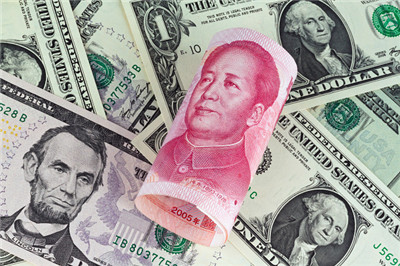All currency wars are self-defeating for their combatants. When a country slashes the value of its currency to boost exports, it inevitably triggers competitive devaluations by its trading partners, thereby robbing the first mover of its initial advantage. Thus it is unlikely that China, which in effect devalued the renminbi by 2 per cent yesterday, was intending to whip up currency skirmishes among its trade partners into a full-scale war.
所有的货币战争都会对参战方自身造成损害。当一国大幅压低其货币币值以提振出口时,不可避免地会引发其贸易伙伴国的竞争性贬值,从而令率先贬值的国家丧失其最初的优势。因此,中国昨天在实质上将人民币贬值2%的行为,其用意不太可能是把贸易伙伴国之间在汇率上的小冲突激化为一场全面货币战争。

But intentions are one thing, consequences another. China’s position as the world’s largest trading power ensures that its action will distribute deflationary pressures throughout its global supply chain, while intensifying pressure on competitors to seek their own currency depreciations. Such pressures will only grow if yesterday’s action signals a sustained trend of weakening, as many analysts expect.
不过,动机是一回事,结果却是另一回事。中国作为全球最大贸易国的地位,导致它的这一举措必然会通过其全球供应链对外传导通缩压力,并加大与其竞争的国家寻求将本币贬值的压力。正如许多分析师所预期的,如果昨天的举措预示着人民币持续走弱的趋势,这种压力只会不断上升。
In its most crucial sense, the impetus for China’s devaluation, which represented the renminbi’s biggest drop since 1993, was self-defence. It is not just that exports have been dismal so far this year and tumbled again in July by 8.3 per cent. It is also that China is suffering from a chain reaction of structural economic ills that threatens to run out of control. As ever, China’s true predicament is obscured by official statistics. The official gross domestic product growth rate was 7 per cent in the second quarter, but several independent analysts estimate that in reality it may be closer to 4 per cent.
从最重要的意义上来说,人民币贬值的动机是自保。这次贬值是1993年以来人民币汇率的最大幅度下调。中国政府会这么做,不仅仅是因为今年迄今出口一直低迷、7月份又同比重挫8.3%,还因为中国正在遭遇结构性经济问题引发的连锁反应,而这种连锁反应有失控的危险。和往常一样,从官方统计数字中很难看出中国的真实情况到底有多糟。比如,今年第二季度中国国内生产总值(GDP)增长率的官方数字为7%,然而据多名独立分析师估计,中国的实际GDP增长率可能更接近4%。
A similar situation exists with investment, an important growth driver. Official numbers put fixed asset investment growth in the first half at 11.4 per cent, but a cleaner measure of how much companies are investing to boost their productive capacities — gross fixed capital formation — is running at an estimated 4 to 5 per cent, from 6.6 per cent in 2014, according to Dragonomics, a research firm. Allowing for the depreciation of existing plant and machinery, it is possible that China has already ceased adding to its productive capacity, Dragonomics estimates.
对于另一个重要的增长引擎——投资——来说,也存在类似的局面。官方数据显示,今年上半年中国民间固定资产投资同比增长11.4%。然而,根据研究公司龙洲经讯(Dragonomics)的数据,中国固定资本形成总额增长率估计为4%到5%,低于2014年的6.6%。而对于企业投资了多少资金用于提升产能,固定资本形成总额是个更纯粹的衡量指标。龙洲经讯估计,考虑到现有厂房和机器的折旧,中国可能已停止增加产能。
Against this background, the renminbi’s devaluation stands as an expression of distress. Certainly, Beijing did not wish it. Li Keqiang, premier, told the Financial Times in March: “We don’t want to see a further devaluation of the Chinese currency because we can’t rely on devaluing our own currency to boost exports.”
在这样的背景下,人民币的贬值是压力的表现。可以肯定的是,中国政府并不希望人民币贬值。今年3月,中国总理李克强曾向英国《金融时报》表示:“我不希望看到人民币继续贬值,因为我们不能靠贬值来刺激出口。”
He added that a scenario in which major economies “trip over themselves to devalue their currencies” would lead to a currency war.
他还补充说,主要经济体“货币竞相贬值”的状态会导致货币大战。
The timing of the U-turn may derive from three main influences. The US Federal Reserve’s signal that it may raise interest rates as early as this autumn could have added to the appeal of pre-emptive action. The renminbi’s 10.3 per cent appreciation against all currencies since the start of 2014 (on a trade weighted and inflation-adjusted basis) may have reinforced perceptions that the redback was overvalued. Lastly, China’s campaign to win acceptance for the renminbi into the International Monetary Fund’s special drawing rights (SDR) basket of currencies in December may have persuaded Beijing to show that it is embracing a more flexible currency regime, one of the conditions for SDR entry.
中国汇率政策急转弯之所以出现在这个时候,也许主要受到了三个方面的影响。美联储(Fed)发出信号,表示最早可能会在今年秋天加息。这一信号可能增加了中国抢先采取措施的动力。自2014年初以来,中国兑所有货币的(经贸易加权和通胀调整后的)汇率上升了10.3%,这可能也强化了人民币币值被高估的印象。最后,中国一直在争取让人民币在今年12月被国际货币基金组织(IMF)纳入特别提款权(SDR)货币篮子。这可能也促使中国政府向外界展示自己正采用更加灵活的汇率制度(这是加入SDR的条件之一)。
But the devaluation could yet have unwelcome effects. It looks likely to amplify China’s export of deflation by making Chinese goods cheaper. This is of concern because the producer price index, which measures aggregate prices at the factory gate, fell in July for the 40th straight month to minus 5.4 per cent. This, coupled with the impact of potential competitive devaluations, looks likely to lead the world into another phase of slower growth.
然而,这次贬值也许还会产生一些不受欢迎的影响。贬值让中国商品更便宜,从而可能会放大中国对外的通缩输出。这一点之所以令人担心,是因为作为衡量总体出厂价格的指标,中国工业生产者出厂价格指数(PPI)今年7月同比下跌了5.4%,为连续第40个月下跌。这一点再加上可能出现的各国竞争性贬值的影响,看起来很可能导致全球进入增长更加缓慢的新阶段。












